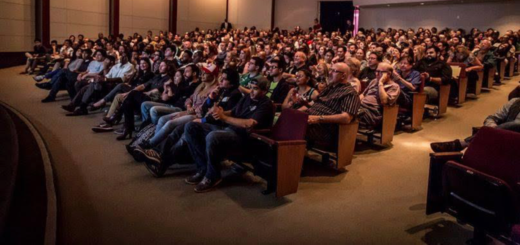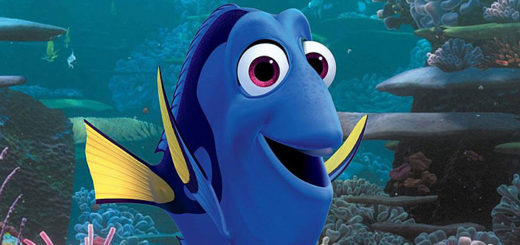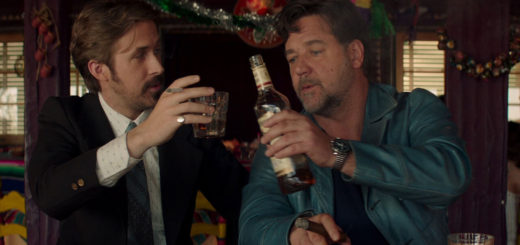STARSHIP TROOPERS: Citizens United
It’s Friday. The air is cool and the sound of the 405 freeway quietly echoes through the night. The Nuart theatre on Santa Monica is filling up with dozens of drunk Angelenos that have unknowingly stumbled into a midnight showing. Just another day in the city of stars, I suppose. I wander into the theatre, ready to finally, after years of delay, take in Paul Verhoeven’s 1997 sci-fi extravaganza, STARSHIP TROOPERS. The film has been on my radar for well over a decade; I distinctly remember playing an RTS bearing the film’s likeness on my now devastatingly outdated PC. But outside of the most obvious aesthetic trademarks, that being military personnel, heavy weaponry, and giant insects, I really knew next to nothing about the film. Looking back, I’m beyond perplexed as to why STARSHIP TROOPERS coasted under my radar so successfully. How did I spend well over 16 years believing that this was nothing more than a B-movie ALIENS clone? And so I sat down in the theatre, ready to receive the greatest blessing in disguise: my first time watching STARSHIP TROOPERS was in a real movie theatre, with a lively audience, and I was in on Verhoeven’s joke, giddily laughing along as I began to realize that 1997 gravely overlooked one of the most indelible satires of the US military complex.
It’s not hard to understand what STARSHIP TROOPERS is going for, as there are countless clues in the poster alone; from Dina Meyer’s perplexing smile to the mock sci-fi title font, I should have seen Verhoeven’s vision coming from a mile away. But perhaps my own cynicism about the laziness of Hollywood and my vapid understanding of pulp fiction led me to shrug it off as poor design and nothing else. Even the title itself draws an uncanny resemblance to the term Storm Troopers, a phrase that Lucas famously borrowed from the Nazi’s Sturmtruppen. Hell, the uniforms appear ripped straight out of RAIDERS OF THE LOST ARK, with each higher-up donning the sharp-edged dress of SS desert uniforms. Looking back, there was so much that was singular in Verhoeven’s design that it quickly began to make sense once the film began to play, but I certainly couldn’t have known just how brilliantly calibrated STARSHIP TROOPERS would be.
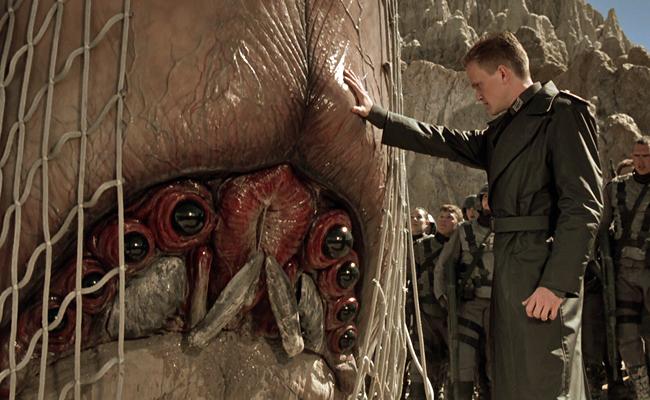
Sprechen Sie Alien?
We open on a delightfully campy news report catching us up to the goings on. Earth is at war with an insectoid alien race, and the titular troopers are leading the fight on the ground. Live from the battlefield, we are given our in media res, in which a newscaster is viciously split in two by a titanic, spider-like creature. So far, so good; STARSHIP TROOPERS was shaping up to be just the lowbrow B-movie that I anticipated. Cut to: Buenos Aires? Enter Casper Van Dien, the most Aryan of all American lead actors (we had seen him briefly during the war scene, but he was suited up and hardly recognizable at this point). Add Neil Patrick Harris and Denise Richards to the mix and you’ve got yourself something of a pureblood elite squad.
To call the ensuing hour left field would be a wallop of an understatement. Instead of the hardboiled action caper that the title promises, Verhoeven relegates much of his first act to high school shenanigans, from jealous boyfriends to sci-fi football. It’s THE OC in space. Good God, this was starting to get really silly. Its all-white cast is lectured about the Arachnid foe by crippled professors, and its South American setting is glossed over as merely incidental. The first thing that is taught to the viewer is that enlisting in the military labels you a “citizen,” making you eligible to vote. As such, two things become clear in the STARSHIP TROOPERS universe: if Buenos Aires is populated by prototypical white Americans that can only vote if they are enlisted military personnel, can we deduce that the Earth is under a totalitarian rule of its own? What if there is more to this war than Verhoeven leads on?
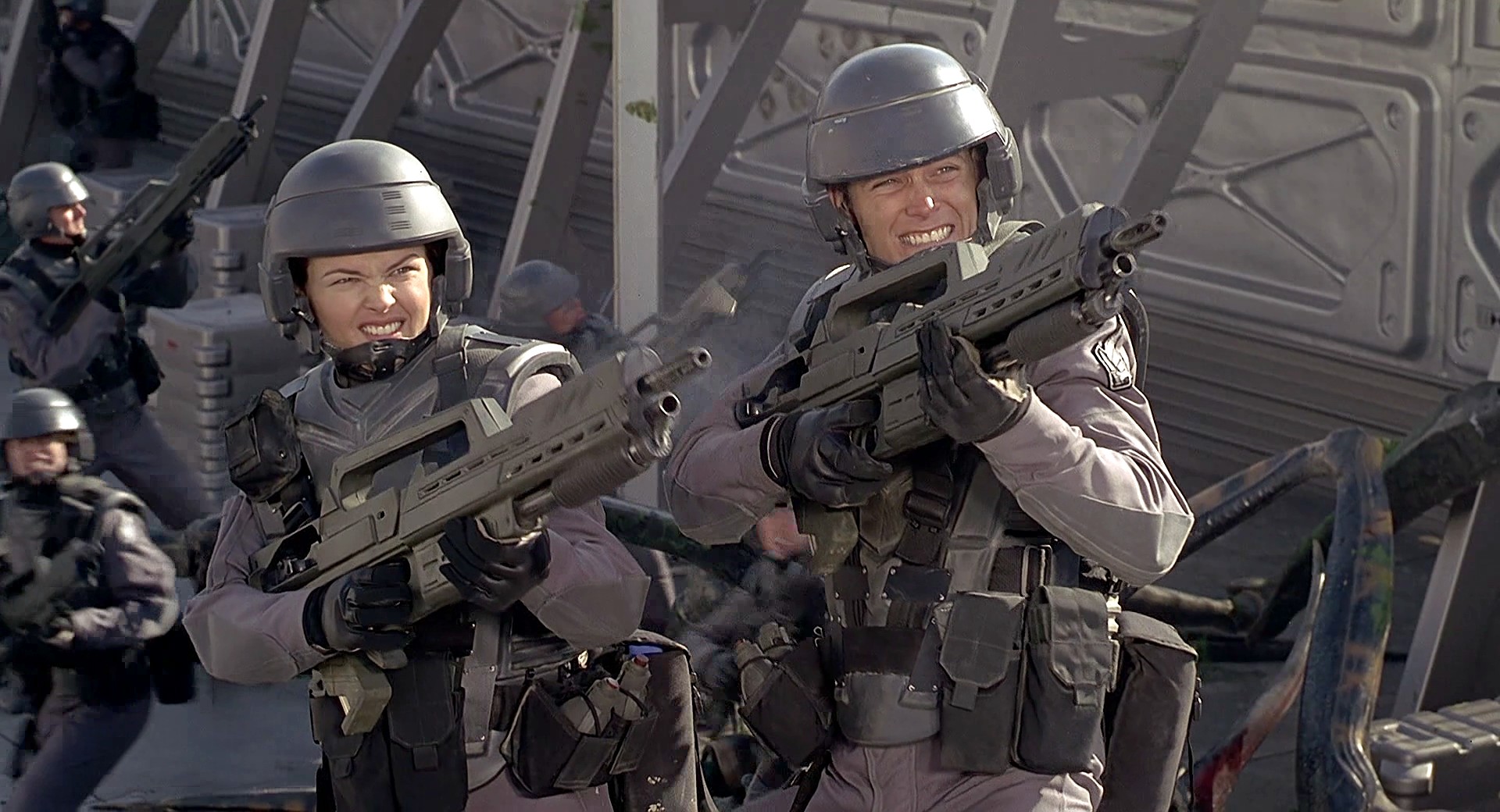
STARSHIP TROOPERS: Defenders of Earth, Caucasians, and all things American
I think it’s reasonable to assume that the casting of Casper Van Dien as Johnny Rico is beyond willful. This wasn’t a conscious objection to Robert A. Heinlein’s Juan Rico, but rather a reframing of an established text. Verhoeven had famously stated his disliking for the book his film is based on, citing that “it really is quite a bad book” in an Empire magazine interview. With that in mind, I couldn’t help but feel that Verhoeven felt the need to appropriate the thematics of this war-torn narrative for the end of the 20th century, a 100-year gap that was mired in senseless brutality, from the Holocaust to Vietnam. STARSHIP TROOPERS was not to be throwaway entertainment, but rather a disturbing glance into gun fetish, patriotism, and America’s narrow understanding of nationalism, all presented under the guise of pop art. Buenos Aires was not to be a diverse melting pot for military recruitment, but rather an occupied territory that would provide the military with its proverbial “meat for the grinder,” as expressed in act two.
The second act of STARSHIP TROOPERS places our characters in boot camp, and establishes a love quadrangle that needlessly complicates its narrative. But even that appears to be willful in its construction. Subverting each cliché to the point of self-parody, Van Dien finds himself in a situation that is such a tongue-in-cheek mockery of tropes established in FULL METAL JACKET and its cohorts that it begins to make you ill. The parallel narrative involving space travel, long-distance dating, and dodging asteroids keeps this from draining the fun out of the ride entirely, and that is perhaps Verhoeven’s greatest accomplishment: wrangling an assured balance of escapism and political commentary. It’s often stated that the anti-war film is an unachievable act, and as seen in Hollywood’s most renowned examples (from PATHS OF GLORY to HACKSAW RIDGE), brutality is often far too enticing to make for a cohesive argument against it.
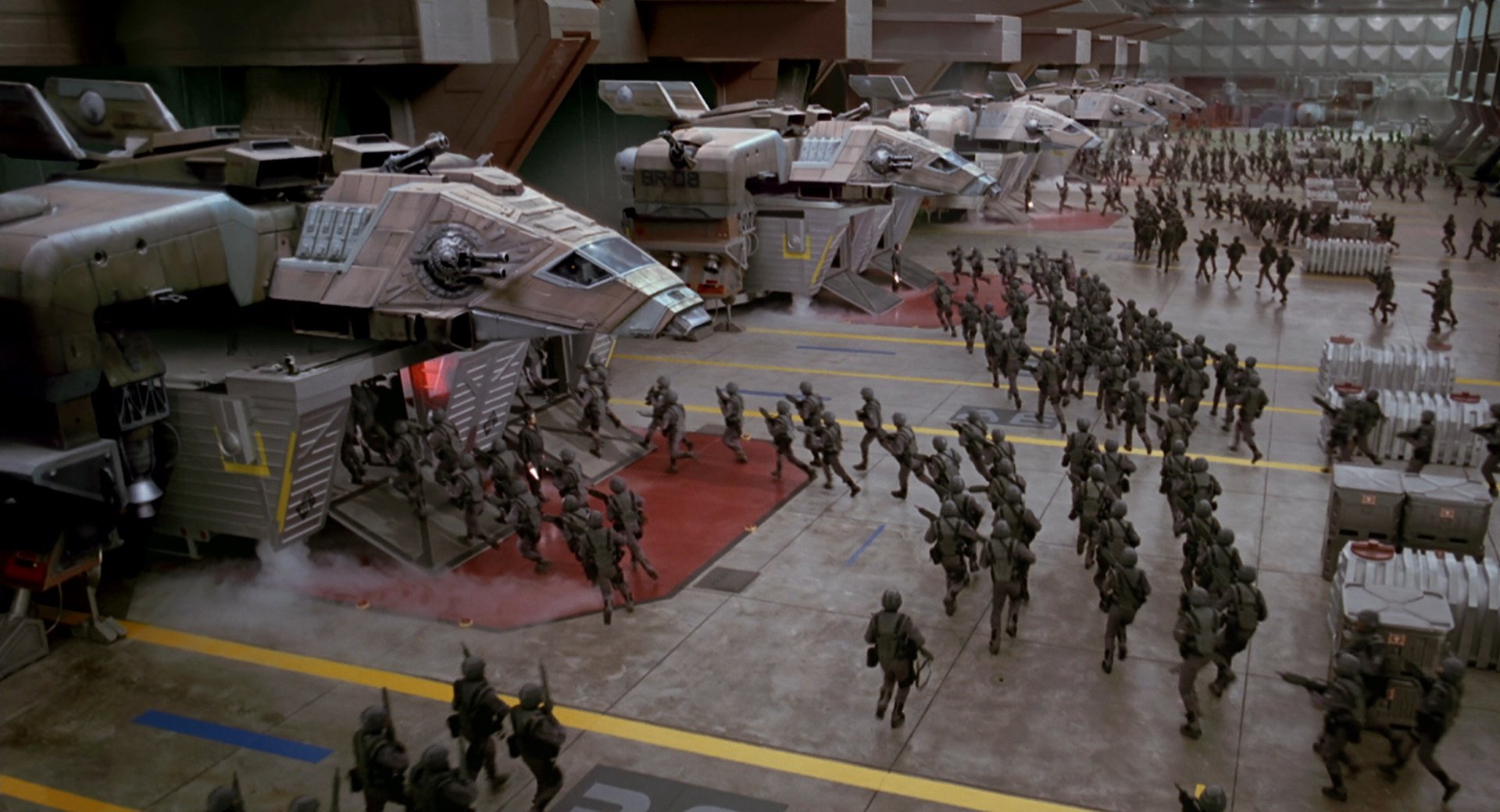
Citizens fighting brutality with brutality!
Consequently, Verhoeven’s ideology runs counterintuitive to this theory. By embracing the bold, brash, unabashedly violent Arachnid warfare, STARSHIP TROOPERS aims to paint its battlefield as so comically awesome that it begins to feel inappropriate. This tactic is doubled down on by giving us two-too-many battles in the third act of the film. Instead of one monumental fight to the death, Verhoeven gives us enough gunplay for a limited series. Of the countless people Van Dien attends boot camp with, only one squadmate appears to survive until the end of the film. In addition, Verhoeven closes his film by making it undeniably clear that this war is still far from over, implying that dozens more will perish.
What becomes a focal point in the final beat of Verhoeven’s opus is the notion of intelligence. Apart from the aesthetic appeal of the Arachnids, I think it’s important to note that much of the film’s message would be lost on viewers if the enemy were any more human. As viewers, we are inherently biased into believing that Earth is the good guy. We know little about the incidents that started the alien war, and inherently believe that anything as grotesque as an Arachnid exists solely to do us harm. When Verhoeven begins to play with the idea that these extraterrestrials are tactical fighters, it becomes obvious what STARSHIP TROOPERS is really going for in its battle scenes. From Neil Patrick Harris playing his best Joseph Mengele, to a satirical debate involving a man’s denial of Arachnid intelligence, it becomes clear that Verhoeven is not only trying to draw parallels between America’s military complex and Nazi Germany, but also the medium of propaganda as a whole. By depicting our enemies as vermin, it becomes so much easier to kill them. This is refined during the newsreels that serve as intermissions between acts. In these segments, we are subjected to extreme brutality that is labelled “censored.” The irony of course is that none of this violence is worse than what we see in the rest of the film, but it reaffirms the notion that the Arachnids are abject offenders whereas humans are pure defenders. Once again, this comes to full fruition when an Arachnid killing a cow is censored, but Neil Patrick Harris shooting a caged, immobile Arachnid to death is left unedited.
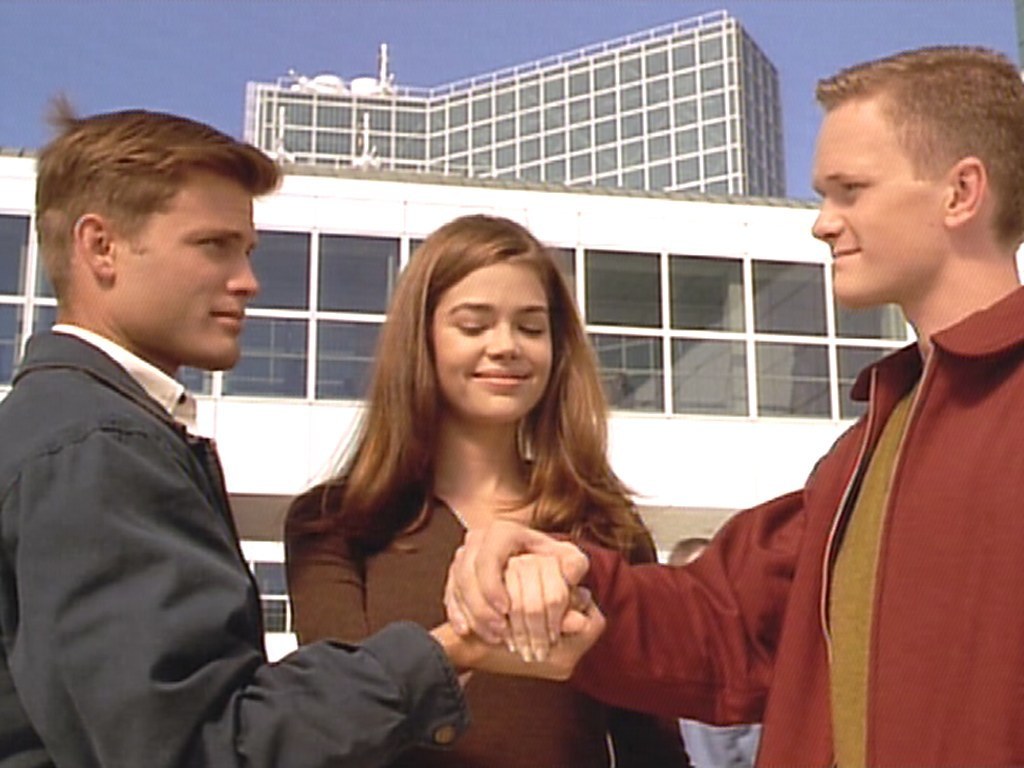
And this film started off as DEGRASSI: 2197!
Naturally, this runs perfectly in line with America’s grotesque history of military racial slurs, from “redskin” to “zipperhead,” and even the ongoing use of the term “savage” in the Middle East. But what interests me more is Verhoeven’s actual dialogue on the cinematic medium as a political device. Of course it’s paramount that the Arachnids are portrayed as insects (hell, it’s Riefenstahl to a T), but when looking further, one begins to realize the backwards ideologies that are front-and-center in STARSHIP TROOPERS. Early on, Denise Richards embraces Van Dien and Harris, proudly declaring, “Let’s swear we’ll always be friends no matter what!” And yet, Harris knowingly allows Van Dien to lead his squad into a trap, and Richards breaks up with Van Dien over a video message. There is no mercy among friends, because there is no mercy in war. While Verhoeven showcases the realities of conflict through his unflinching treatment of his characters, the glossy, colorful palette serves to contradict this. There is so much fun to be had in STARSHIP TROOPERS’s production design, costuming, and space travel that the moments of brutal commentary suck the entertainment right out of you.
The joke of course is that STARSHIP TROOPERS is played straight. Verhoeven gets his message across by patently not winking at the camera, and that’s what makes the entire experience so thrilling; it’s fun as mindless entertainment, but decidedly more rewarding for those who take a minute to think of its implications. Anyone can watch STARSHIP TROOPERS as pulpy spectacle, and I know for a fact that some viewers in the Nuart enjoyed it as nothing more. And that’s OK! Verhoeven is well aware that it’s absurd to have his protagonists joyously exit frame as if they’re attending a high school reunion, but he also knows that you kind of want to relish this amoral happy ending. Van Dien goes through the most aggressive transformation from overly-ambitious rookie to squad leader, and as such, we witness his reconciliation with the art of war. He is taught that putting a fellow soldier out of their misery is noble and that dying on the battlefield is a high honor, despite the fact that there’s nothing honorable about having your brain sucked out by a fat blob’s pincher. By closing his film with a smile, Verhoeven justifies all the loss and heartbreak that precedes his conclusion, allowing STARSHIP TROOPERS to occupy pro-war and anti-war propaganda in the same frame. It’s what the viewer makes of it. The irony, of course, is that most make nothing of the film, drunkenly leaving the Nuart just as they entered it. Visually and tonally, Verhoeven sells us on the necessity of war, but subconsciously he chastises it. For those that are still not convinced that STARSHIP TROOPERS isn’t just camp, then consider why the troopers exist in the first place? The Arachnids have no means of defending themselves from airborne weaponry, and yet the hapless troops are sent to attack them on foot! It’s a willful critique of America’s reckless endangerment of its own military personnel. “Always be friends no matter what” my ass.

